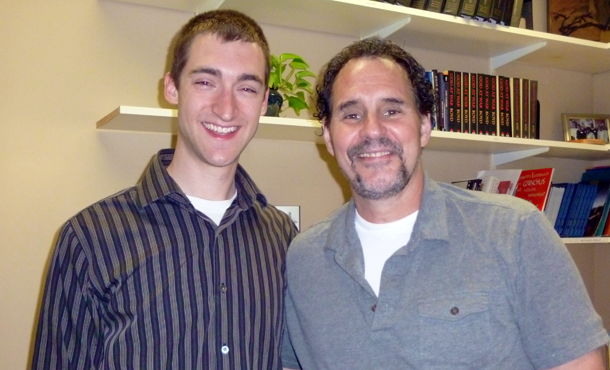Eastern Mennonite Seminary student Brad Kolb got a fresh perspective on Mennonite culture by immersing himself in an urban megachurch led by well-known author and pastor Greg Boyd. For 12 days in the late spring, Kolb traded the pastoral setting of his 180-member, tan-brick, steeple-topped Virginia church for a Minnesota church that welcomes thousands each week to a block-long building that was once a home improvement chain store.
“My experience at Woodland Hills Church helped me to see the line between Anabaptist theology and Mennonite culture,” said Kolb, who is the youth pastor at Grace Mennonite Fellowship near Harrisonburg, Va. “It made me think about how we can take Anabaptist theology into other cultures or sub-cultures.” Hundreds of the newest attendees at Woodland Hills come from the surrounding community, largely populated by African-Americans, Hispanics and Hmong immigrants from Laos.
Kolb, who has spent most of his life surrounded by “ethnic Mennonites” in small, rural Virginia churches affiliated with Mennonite Church USA, wanted to get a different kind of cross-cultural experience and contacted Woodland Hills.
“I have gained a new spark for Anabaptist theology,” says Kolb. “I could see how life-changing and new it can be” to those who have been attracted to this theology rather than born into it.
“Greg’s interactions with people who listen to his podcast [heard by thousands each week], and are excited about his teaching, have shown him how Anabaptist theology is really important for the church in the United States. He wants [born and raised] Mennonites to get excited about it too.” Of the 15 books authored or co-authored by Greg Boyd, two of the best-known are The Myth of the Christian Nation: How the Quest for Political Power Is Destroying the Church (2009) and Letters from a Skeptic: A Son Wrestles with His Father’s Questions about Christianity (2010).
“We are at a place in the United States where Anabaptism suddenly makes sense to people,” says Kolb.
Kolb spent time learning about various ministries of Woodland Hills and about how the Central Plains Mennonite Conference has been interacting with Woodland Hills staff as they explore Anabaptist beliefs and practices. Woodland Hills is weighing whether to join the conference or to partner with Mennonites in a variety of ways.
“Some of the [staff’s] perceptions of Mennonites were good, like Mennonite Disaster Service and Mennonite Central Committee, and then there were others who only knew about Mennonites from the media and shows like “Amish Mafia” on the Discovery Channel. I got a lot of questions about buggies and electricity,” Kolb says. “One of the things I learned is that Mennonites default to community, where most evangelical Christians default to individuality.
“This experience has opened some new possibilities in terms of where I see myself in ministry in the future. Before I would have been comfortable serving a culturally Mennonite congregation, now I think I can see myself in leadership in a variety of settings.”
